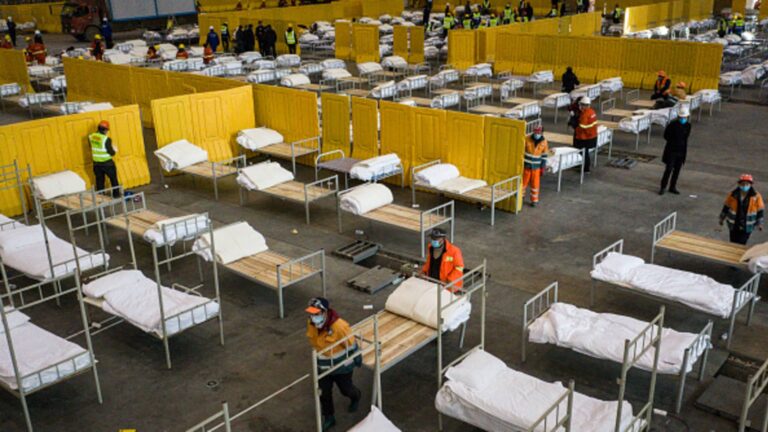
[ad_1]
The view of the Wuhan Keting in Wuhan, central China’s Hubei Province. Wuhan in central China’s Hubei Province started converting three existing venues, including a gymnasium and an exhibition center, into hospitals to receive patients infected with the novel coronavirus (2019-nCoV), the headquarters for the epidemic control said late Monday.
Getty Images
BEIJING — China‘s health commission said Friday it removed 108 deaths from the total figure due to a double-count in Hubei province, the epicenter of the global coronavirus outbreak.
The pneumonia-causing virus has killed a total of 1,380 people in mainland China as of the end of Thursday, the commission said in its Chinese-language daily online report.
In parentheses after the death count, the statement added, per a CNBC translation: “Because of duplicated Hubei province statistics, 108 are written off.”
The National Health Commission had reported 1,367 cumulative deaths as of midnight Wednesday, following Hubei’s report of 242 additional deaths from the virus that day.
Friday’s report is the second day in a row the province’s data has caused major changes to a nationwide figure. And it adds to doubts many have about the accuracy of the data. On Thursday, a senior administration official told CNBC the White House does “not have high confidence in the information coming out of China” regarding the count of coronavirus cases.

Early Thursday morning, Hubei’s health commission reported the number of newly confirmed cases in the province of roughly 60 million people multiplied nine-fold from 1,638 on Tuesday to 14,840 on Wednesday.
The surge was the result of Hubei adding its new category of “clinically diagnosed” cases to the confirmed cases count. This new designation is part of an effort to allow more patients to get the same level of treatment, the commission said in an online statement, according to a CNBC translation of the Chinese text.
Nearly 90%, or 13,332, of those newly confirmed cases fell into the “clinically diagnosed” category. The commission cited the No. 5 trial measures of a national-level virus response plan, which noted that just for Hubei province, clinically diagnosed cases would include suspected cases for which radiation scans showed signs of pneumonia.
The trial measures were released last week, and it is unclear why Hubei suddenly decided to implement them on Thursday. The daily count released Friday showed 4,823 newly confirmed cases, with 3,095 falling into the clinically diagnosed category.
Beijing shakes up the provincial leadership
However, the aberrations in Hubei’s figures come amid reports of overworked local medical staff, inadequate health-care conditions and a shakeup in the regional government.
On Tuesday, the deputy director of the National Health Commission Wang Hesheng became party secretary and director of the Hubei Province Health Commission.
On Wednesday, Chinese President Xi Jinping called for resolute efforts from all levels of government to overcome the virus’ spread, according to state media reports. He was speaking at a meeting of the Standing Committee of the Political Bureau of the Communist Party of China (CPC) Central Committee.
Late Thursday morning, more political changes were announced. Authorities said Shanghai Mayor Ying Yong would replace Jiang Chaoliang as party secretary of Hubei province, and that the party secretary of Jinan, capital of Shandong province, Wang Zhonglin, would replace Ma Guoqiang as party secretary of Wuhan Municipality.
WHO officials said Thursday that the increase in confirmed cases in China shouldn’t be characterized as a “spike.” Earlier in the week, officials from the organization also said it’s normal to change how cases are defined.
— CNBC’s Berkeley Lovelace Jr. and William Feuer contributed to this report.
[ad_2]